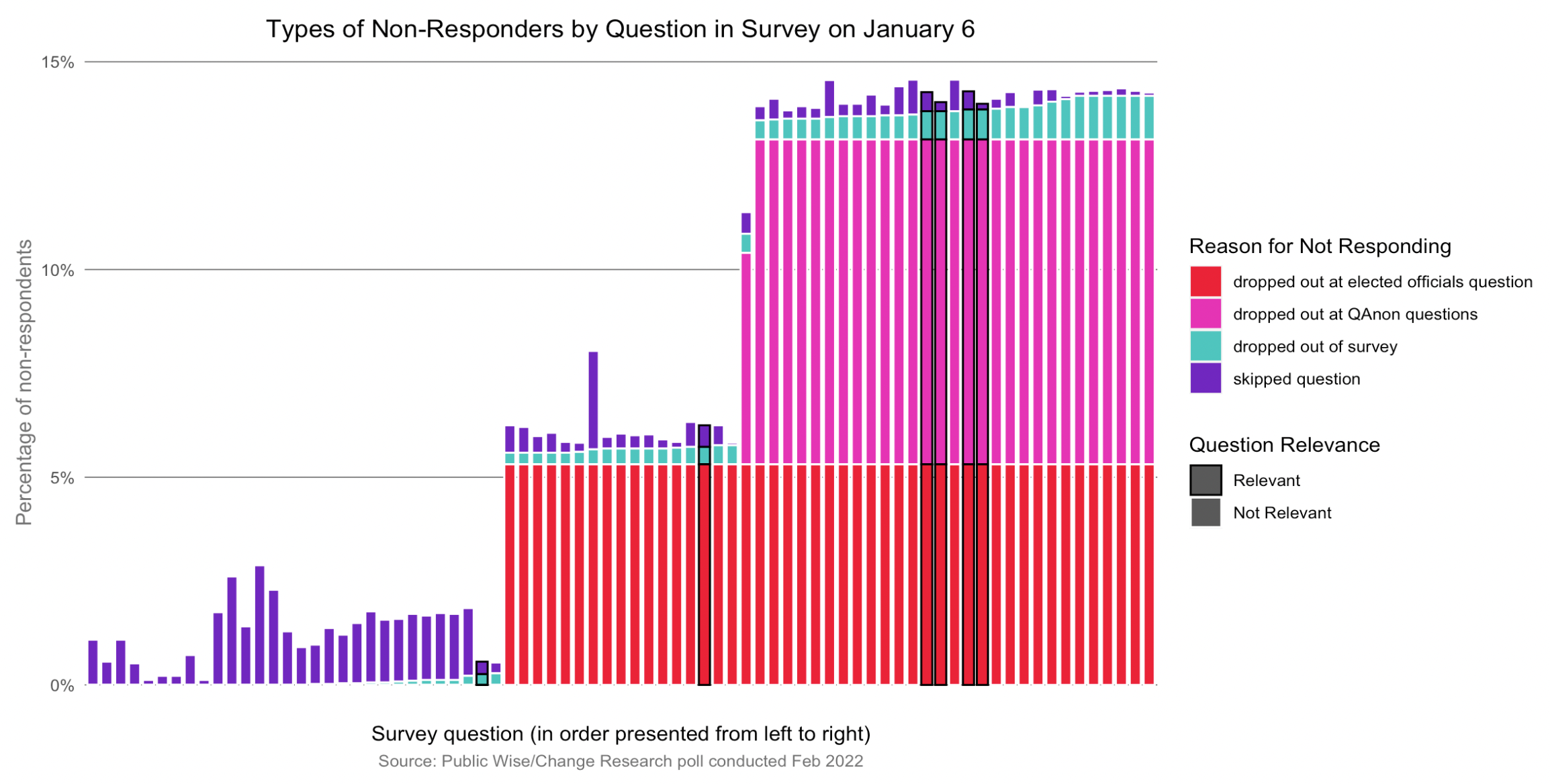Ethnonationalism and January 6th
Does ethnonationalism shape conservative attitudes around January 6? To some extent, but other factors matter more.
In the first blog post on our series on attitudes around the January 6 attack on the Capitol, we explored the theory that Christian nationalism was a primary driving force behind the public’s views on January 6. Digging into the data using a Public Wise/Change Research poll of 5,028 American adults conducted in February 2022, we found this theory did not give an entirely satisfying explanation for why roughly half of conservatives do not want accountability for those who participated in the attack on the Capitol.
In this post, we explore the role that different types of ethnonationalist attitudes – white supremacist, anti-immigrant, and anti-diversity – may play in influencing conservative public opinion around January 6.
Many white-supremacist and anti-immigrant nationalist hate groups promoted going to the Capitol and participating in the insurrection. Sociologists like Rashawn Ray have argued that the insurrection “opened a Pandora’s box of hate into the American mainstream, giving the permission some racists needed to reveal themselves proudly and wreak havoc on symbols of American democracy.”
Various kinds of ethnonationalist symbolism abounded at the Capitol: Insurrectionists hung nooses, evoking lynching, sported white supremacist tattoos, held up flags of the Confederacy and various modern day anti-immigrant or white-supremacist groups
Recent research has examined ethnonationalism and ethnonationalist beliefs in conjunction with the 2016 election and support for former President Donald Trump, who made race and immigration central pillars of his political platform. First and foremost, research showed that opinions on ethnonationalism have aligned in a partisan fashion (Manza and Crowley 2018) and were strongly associated with vote choice in the 2016 election (Thompson 2021). Racial and immigration attitudes were particularly powerful predictors of vote switching to Republicans among both working-class and non-working class whites in 2016 (Reny et al., 2019).
Our research finds that for conservatives, holding various kinds of ethnonationalist beliefs – white supremacist, anti-immigrant, prejudice against non-English speakers, and anti-diversity – were all associated with wanting less accountability for January 6 insurrectionists. But our formal model, taking into account a variety of ideological factors, only identified being anti-diversity as being an important factor distinguishing conservatives who want accountability from those who do not.
Public Wise’s Survey
In our February poll, Public Wise asked a wide-ranging set of questions. One key question we asked was, “How important do you think it is that the people who participated in the events of January 6th be held accountable for their actions if a court determines they broke the law?” Among both self-identified progressives and liberals, support for accountability was near-unanimous, and a small minority of moderates did not feel accountability was important. Conservatives, however, were split into roughly equal parts between those who thought accountability was important and those who did not.
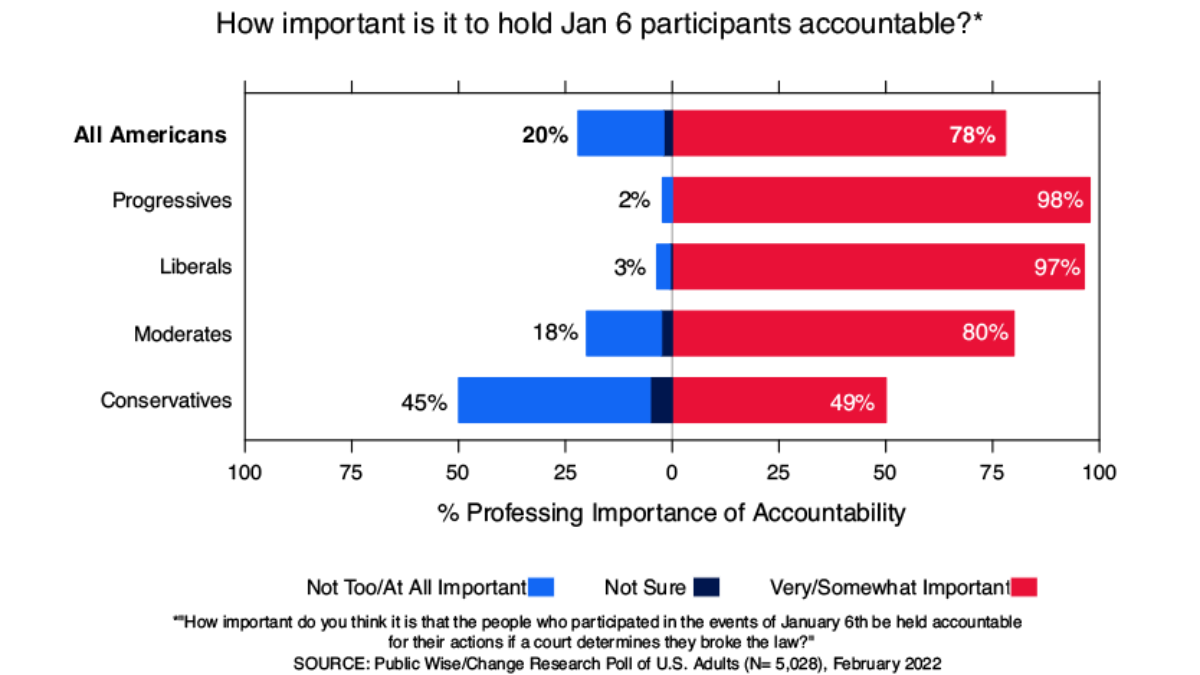
Public Wise’s survey included several questions to evaluate the role played by anti-immigrant and white-supremacist attitudes in influencing views on January 6. We asked the following questions:
- In your opinion, how important do you think being born in America is to being truly American?
- In your opinion, how important do you think being able to speak English is to being truly American?
- In your opinion, how important do you think being of Western European descent is to being truly American?
- In your opinion, how important do you think accepting people of diverse racial and religious backgrounds is to being truly American?
Please note that our analysis includes various categories of missing responses to our survey. For more information on how we understand and incorporate missing responses in the analysis, see the end of this blog post.
Similar to our measures of Christian nationalist attitudes, views on each measure are highly correlated with self-professed political ideology. While most Americans, including conservatives, believe that having Western European origins is not important and that accepting diversity is important, those with diverging views were disproportionately likely to be conservative. As for the importance of being born in America, few liberals or progressives found this important, while a third of moderates and most conservatives did. A majority of progressives and liberals did not think it was essential to be able to speak English to be truly American. However, a strong majority of both moderates and conservatives thought it was.
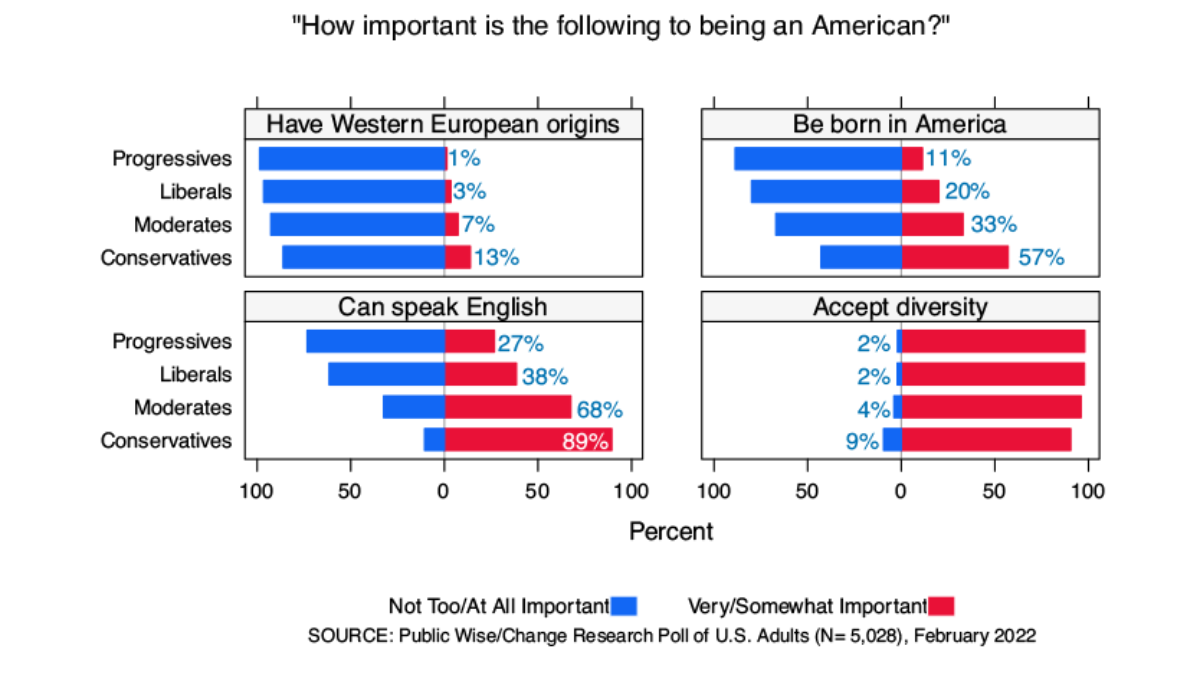
Because political ideology is already such a dividing line between those who want accountability for insurrectionists and those who do not and a dividing line for ethnonationalist attitudes, we focused our remaining analysis on conservatives.
Most ethnonationalist attitudes are weakly correlated with conservatives’ views on January 6.
Below, we provide a visualization of the cross tabulations for holding ethnonationalist beliefs and views on accountability for U.S. conservatives .
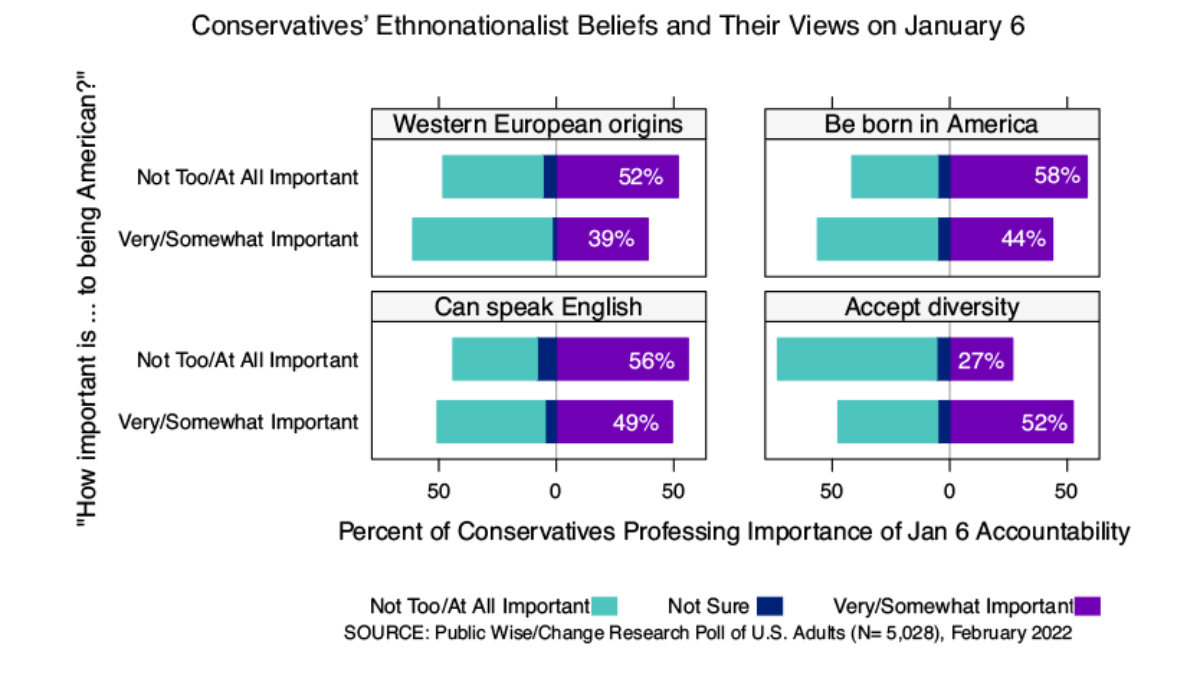
We can see a correlation with views on accountability for our Christian nationalist measure that most explicitly focuses on a white-supremacist facet of ethnonationalism. This measure asked about the importance of having Western European origins to being truly an American. A slight majority of conservatives who thought this was mostly unimportant also wanted accountability for those who attacked the Capitol. Only 39% of conservatives who believed this was important wanted accountability.
Conservatives’ views on the importance of being born in America was less strongly correlated with their attitudes towards January 6. Of those who thought this measure was mostly unimportant, 58% wanted accountability, whereas only 44% of conservatives who thought being born in America was important wanted accountability.
The weakest correlation was the importance of being able to speak English to being an American. Of those who thought this measure was mostly unimportant, 58% wanted accountability compared to 49% of conservatives who thought it was important, the same as the average for conservatives in general.
One question stood out as having a more dramatic impact on support for accountability. We asked: “In your opinion, how important do you think accepting people of diverse racial and religious backgrounds is to being truly American?”
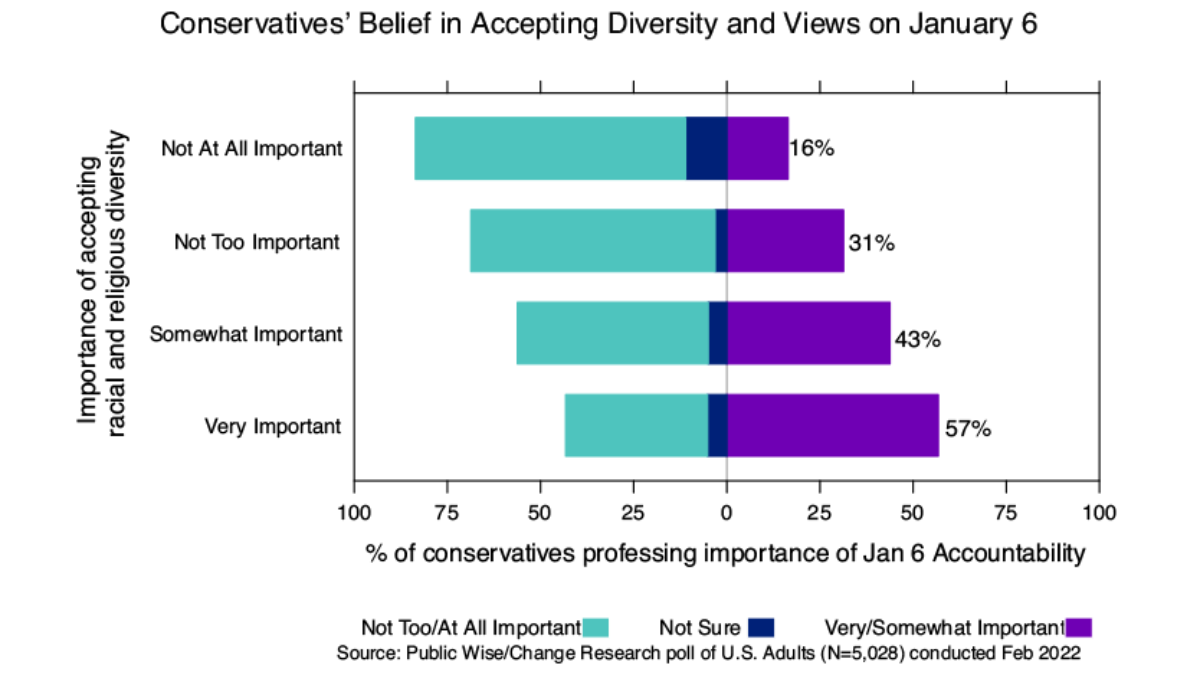
Of those who thought this was very important (in line with most Americans), 57% wanted accountability for insurrectionists. But for those who thought this was not important at all, just 16% wanted accountability.
Why different ethnonationalist measures have different effects
Our different ethnonationalist measures were not strongly correlated with each other the way our Christian nationalist measures were, which we combined into a multiple-item scale. The Cronbach’s Alpha, a measure of internal reliability, between these 4 measures is only 0.69. Additionally, Multiple Cluster Analysis, which describes how similar certain variables are to one another, shows that the “accept diversity” question stands apart from the other ethnonationalism questions.
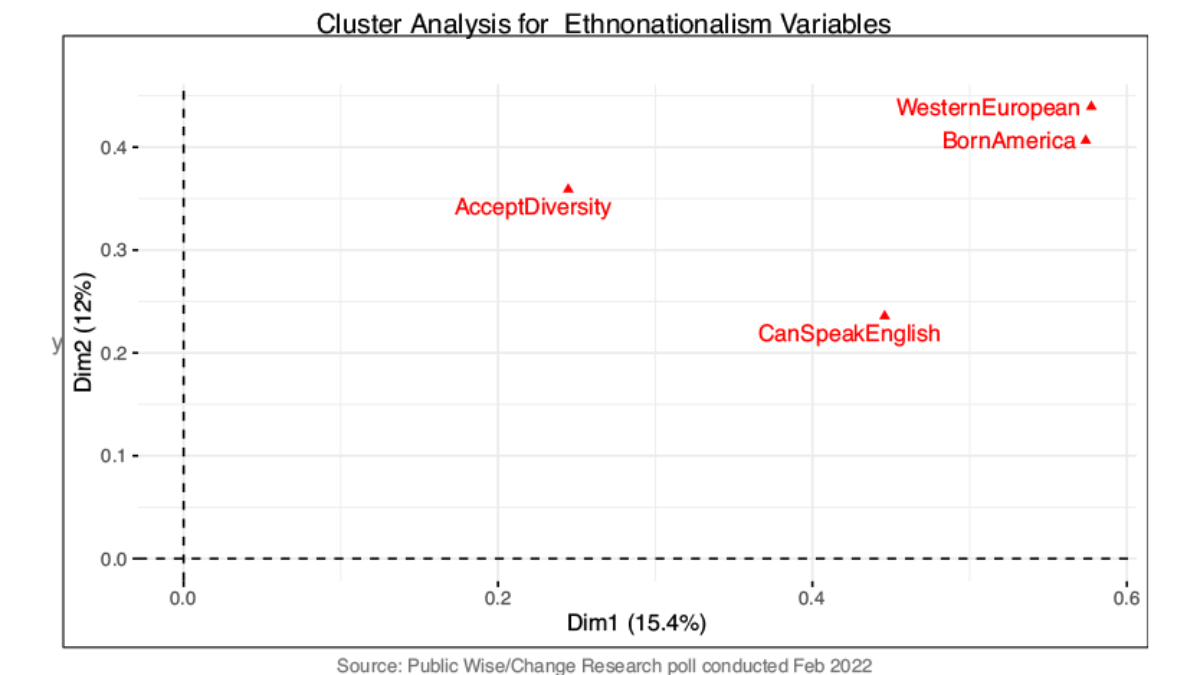
Why was “accepting diversity” such a distinctively important variable? One possible explanation is that the moral bar for the “accepting diversity” question is higher than for the other three questions. Accepting diversity implies changing one’s own attitudes and behavior towards others, while the former three questions involve an assessment of other people.
Alternatively, perhaps the question’s invocation of both “religious” and “racial” diversity results in a stronger effect than when looking at just ethnonationalist and Christian nationalist ideologies separately.
Interestingly, in his study of the January 6 insurrectionists, political scientist Robert Pape found that believing in the Great Replacement Theory was among the strongest predictors of sentiments related to January 6. Great Replacement Theory is the rightwing conspiracy theory that says Democrats attempt to gain power by replacing the electorate with “more obedient voters from the Third World.”* Pape’s finding could result from asking about ethnonationalist attitudes in a distinct way which captures different facets of nuance around these attitudes.
It is also worth noting that these measures may be subject to different levels of social desirability bias. Social desirability bias refers to the tendency of survey respondents to bias their answers away from what are perceived to be more socially unacceptable attitudes, such as explicit racism. A primary effect this might have is to bias our results somewhat if people are reluctant to admit to believing in the importance of being of Western European descent for instance. In this case, the results we find about how beliefs around this issue are related to accountability might be weaker than their true correlation in the real world.**
Our research finds that other factors beyond ethnonationalist attitudes were also important to understanding views on accountability among conservatives . We will cover these more in future blog posts, or you can read our complete findings and technical analysis in our white paper.
Notes on Missing Data
Our missing responses in the survey were not at random, but were concentrated around respondents dropping out at two politically sensitive sections of the survey. Therefore, instead of excluded them from our dataset and only using respondents who answered all relevant questions, we included these respondent dropouts as an integral part of the analysis. Because these dropouts occur before and after different relevant questions in the survey, the analyses in this post use a range of none, one, or two categories of missing responses. For a more detailed understanding of missing data in our survey, how we think about dealing with missing data, and why we decided to include it in our analysis instead of ignoring it, take a look at our post on this topic.
For a visualization of where missing responses occur in the questions relevant to this particular blog post, see the graph below:
Quick Links
Because those who dropped out of the survey at the QAnon questions did not go on to complete any of the questions related to ethnonationalism, we do not know these respondents views for these measures. We do know that those who dropped out at the QAnon questions were disproportionately likely to self-identify as conservative.
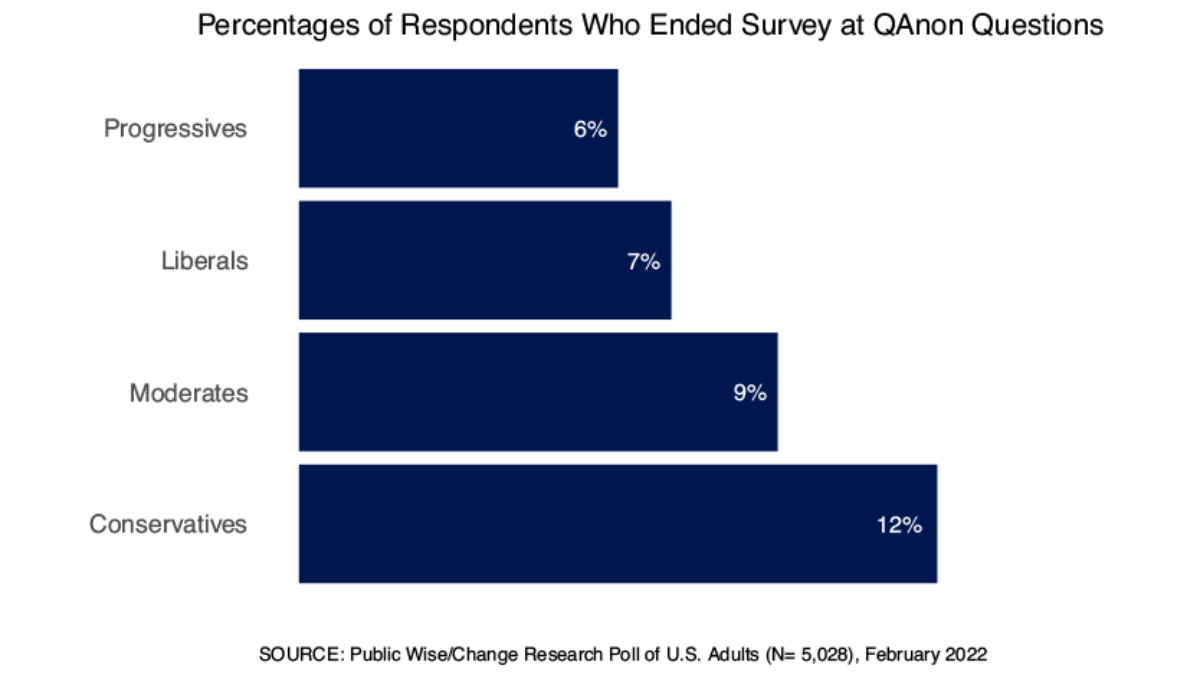
But, as can be seen below, it seems that for conservatives who dropped out of the survey at the QAnon questions, their views on accountability are comparable to conservatives who completed most of the survey.
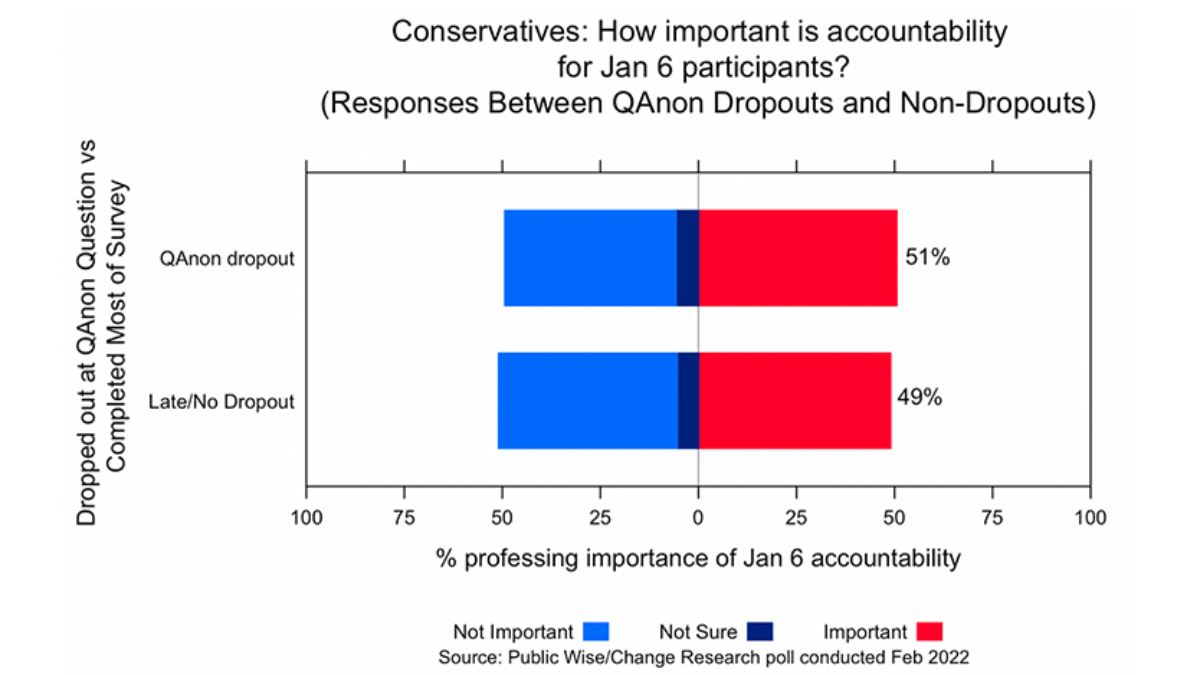
FOOTNOTES:
* There is a spectrum of definitions for “Great Replacement Theory” but this is how Robert Pape defines it in the wording of the study.
** One example of how social desirability bias manifests in the world was by creating potential polling bias in the 2016 presidential elections. Brownback and Novotny (2018) use a list experiment which allows participants to conceal their individual response to a question about candidate preferences, in order to minimize social desirability bias. They found that when explicit polling tended to overstate respondents’ preferences for Clinton relative to Trump.
